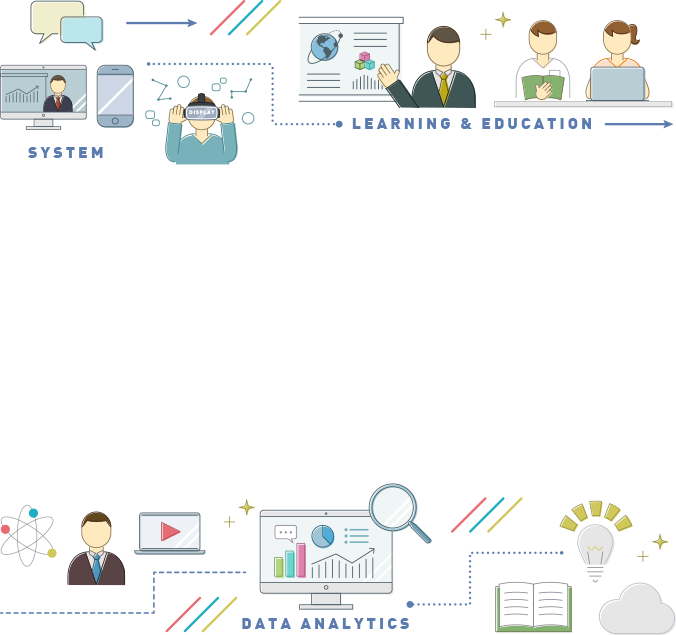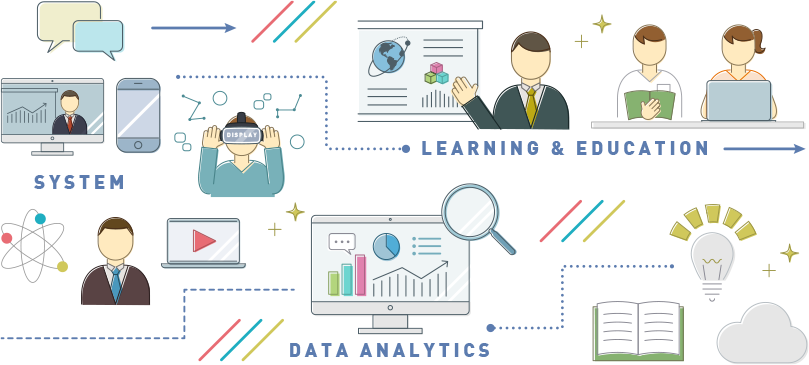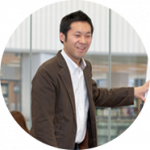To those who wish to take the entrance examination for Yamada Laboratory
This section provides an introduction to educational technology for those who are beginning to develop an interest in educational technology and those who wish to actually pursue research in the field. The page also introduces the basic literature and journals necessary for conducting research in educational technology in general and in the Yamada Laboratory in particular (similar to a pathfinder). Those who visit this page may be interested in improving classes in the field, in utilizing information and communication technology (ICT) such as e-learning in the classroom or may simply wonder what "educational technology" is. Let us begin with a brief explanation of educational technology.
Educational technology is described as "an interdisciplinary field that makes practical contributions to improving education, and is a study that aims to systematize techniques and innovations to improve educational outcomes" (Japan Society for Educational Technology, 2000). A recent definition by the Association for Educational Communications & Technology (AECT), 2008, defines it as " the study and ethical practice of facilitating learning and improving performance by creating, utilizing, and managing appropriate engineering processes and resources" (Richey, 2008). The major goal is not just to practice, but to derive a model or system that has some degree of generality in the situation (context) in which the research field is used.
The three main approaches that have been used in educational technology research so far are behaviorism (the idea that externally observable human behavior based on the relationship between stimulus and response is the object of evaluation), cognitivism (the idea that education and learning programs should be optimized based on the information processing processes that occur inside humans), and social constructionism (the idea that learning is the process of reconstructing knowledge structures that humans already possess through interaction with other people and artifacts). While the goal of educational technology always has been to return to practice, it is also important to conduct research on the preliminary stages of practical development, while keeping the development of practice as the goal. In educational engineering research, when some treatments, models, or systems are used in practice and disseminated, it is necessary to examine whether they are really effective. In some cases, this is done experimentally by establishing experimental and control groups and comparing their effectiveness, while in other cases, the approach is to improve the developed model, treatment, or system in practice by returning to theory and adapting it to fit practice.
Educational technology is a field of applied research in a variety of research fields. Basic research fields of educational engineering include not only pedagogy, but also educational psychology, learning science, anthropology, statistics, and, for those interested in the use of ICT, information science. In recent years, there is also research that utilizes research methods handled in brain science. We will utilize theories and research methods treated in each basic research field. It is not enough to refer to these research findings only in Japan. Research on educational technology is being conducted in various parts of the world. Therefore, it is essential to refer to English literature. Therefore, English is also necessary.
The field of research is very broad, ranging from early childhood education to lifelong education and learning. Employee education and medical education are also fields that are attracting attention. Therefore, in recent years, the backgrounds of those interested in educational technology have been diverse, and not only students and schoolteachers, but also those involved in human resource development at companies, university staff engaged in FD/SD, and doctors and nurses in medical education have become increasingly interested in the field.
参考文献
- 赤堀侃司 (2002). 教育工学への招待ー教育の問題解決の方法論, ジャストシステム, 東京
- 日本教育工学会 (2000). 教育工学事典, 日本教育工学会(編), 東京
- Richey, R. C. (2008). Reflections on the 2008 AECT Definitions of the Field,TechTrends, 52(1) 24-25
- 坂元昂, 岡本敏雄, 永野和男 (2012). 教育工学選書1 教育工学とはどんな学問か,ミネルヴァ書房, 京都
We will now answer to frequently asked questions below.
- Q:What specific studies are there?
There is a great variety of research. There is survey research to find out how ICT is used in education at educational institutions and companies, development research to develop e-learning, digital teaching materials and CSCL environments, and methods to improve classes, and practical research to verify the effectiveness of new practices using existing systems, etc. Research methods range from quantitative research using questionnaires, tests, and logs in the case of ICT-based research, to qualitative research using open-ended questions, interviews, and observations. There is also a blend of these research methods. If you are interested in specifics, please refer to CiNii, which is operated by the National Institute of Informatics, and search for “Transactions of the Japan Society for Educational Technology” to read papers older than the latest one year for free.
- Q:What kind of research is conducted in the Yamada Laboratory?
Yamada Laboratory focuses on learning environment design, especially collaborative learning environment design research (CSCL) using information and communication technology (ICT) based on the social constructivist view of learning and learning analytics research to improve teaching and learning environments by analyzing logs from eBooks, concept map tools, and other tools. We are focusing on the following areas. Our research activities range from the theme of how ICT should be introduced for cooperative learning at educational sites and learning places, to the development and evaluation of systems to support cooperative learning, their dissemination, and the construction of learning support environments in learning commons, which are recently being built in university libraries, to the design of physical classroom environments and learning environments, and the construction of learning support environments in these environments. We are also engaged in research and practice related to the design of physical classroom and learning environments, learning support, and staff development in these environments. Specific research keywords are
・Development and evaluation of teaching materials utilizing ICT
・Computer-Supported Collaborative Learning
・Technology-Enhanced Language Learning (TELL), Computer-Assisted Language Learning (CALL)
・Use of social media in teaching and learning
・Measuring the effectiveness of learning commons and active learning spaces, and developing and evaluating learning support methods and programs in these spaces
・Informal learning using ICT
・Development and evaluation of game-based learning and game teaching materials for education and learning
・Flipped learning using ICT
・FD based on the use of ICT
・Development and evaluation of learning systems utilizing theories such as self-regulated learning
・Mobile learning
etc.For specific details and projects, please refer to my profile and projects.
- Q:What kind of students do you want?
I have written about this in a previous blog entry, so I will just adapt it here.
1: Students who want to do proper research.
Graduate school is not a place to acquire skills, but to conduct research. Furthermore, research on education and learning is conducted not only in Japan but also in many other countries, and it is essential for students to understand overseas research findings, such as in international journals, in order to conduct research on education and learning. I know that many people are not good at English, but even if you are not good at it now, it is important to have the will to overcome the difficulty. The option of “I’m not good at it, so I won’t read or do it” is not an option in this field. The cycle of researching what you don’t understand, learning to understand it, critiquing it, and applying it to your own research is required for a master’s degree, a doctorate, or in the daily life.Students who have never studied educational technology before are also welcome. There are four seminars in the Yamada Laboratory, where students can acquire basic knowledge of educational technology. Upon enrollment, students are required to participate in these seminars, where they can acquire research skills and link them to their own research. The knowledge and skills gained through the seminar can be applied not only to research but also to various other areas.
2: Active students
In graduate school (or is it the same in undergraduate school?), you cannot get any opportunities as long as you wait around. Naturally, the same is true in the corporate world. I would like you to increase your number of companions, both domestic and international researchers and students, by challenging yourself to make presentations at academic conferences and international meetings both in Japan and abroad. In addition, research cannot be done only with the knowledge obtained in class. Please continue to study and acquire knowledge and skills related to your research. You cannot complete graduate school with the mindset that everything will be taught to you. This is true not only at Kyushu University but also at other universities.3: Energetic students
Not only physical strength, but also enthusiasm and sincerity are necessary. Enthusiasm and sincerity can be conveyed. This is true both in research and in society, such as in companies. But passion alone is not enough. It is meaningless if you spin around with just your feelings without any scientific basis for it. Be careful about that.4: Students who like to collaborate
Everyone should help each other’s research and projects conducted in the laboratory to succeed, and through this, grow themselves as well. This is something you need to do when you go out into the world.- Q:Do you accept working students?
Yes, we accept them. However, we would like working adults to calmly consider the meaning and burden of “research” in graduate school before choosing the path of entering graduate school. In order to think about the meaning and significance of “research” on your own, you should first ask yourself why you cannot just take classes as a “non-degree student”? Please also ask yourself “Why not just take classes as a “credit course student”? It is possible to take classes, acquire knowledge, and bring it back to your own practice to solve problems. What is the point of spending two years doing “research” and getting a master’s degree over and above that? If you cannot think of that meaning, unfortunately, it will be tough to make it in the current Japanese graduate schools.
The desire to go to graduate school and do research while working is wonderful. However, that choice is still physically and mentally demanding because of what you have done, unless you are ordered to do so by your work. Being “busy with work” is not a reason for “not making progress in research. It is the same in your work. It is impossible to be lenient on the quality of your research because you are a working person. Conducting original research by consulting research literature in Japan and abroad, especially overseas, has nothing to do with your position as a working adult or a student who has just graduated from an undergraduate program. Working students who are prepared to make time, manage their time, and face the difficulties of conducting research are most welcome, and we will provide them with proper research guidance.
The Graduate School of Human Environment Studies, Department of Educational Systems, Kyushu University is a “researcher training” graduate school. Our main objective is not to train practitioners. We suggest that you consider your request for a graduate school or laboratory with this point in mind. There are graduate schools and professional graduate schools whose main purpose is to train practitioners. Please consider those options as well, in relation to what you want to do and the career you are aiming for.
- Q:About the entrance examination.
If you are interested in taking the exam, please be sure to contact me by e-mail first. Since the entrance examinations are usually held from the end of August to the beginning of September (early February for spring entrance examinations), you should contact me by June at the latest (November for spring entrance examinations). July is too late to contact me, especially for students who are not education graduates or who have never studied educational technology. Frankly, it is tough.
I would ask you to contact me and actually talk with me face to face and really think about whether you want to apply to graduate school. I would like to share thoughts with each other, and I would like you to understand my teaching policy before making a decision. Also, if you would like to do a research theme that I cannot handle, I will introduce you to graduate schools and laboratories that I can recommend.- Q:How can I apply for the examination?
Please obtain an application form from the office of the Graduate School of Human Environment, Ito Campus, Tohoku University, and follow the procedures.





